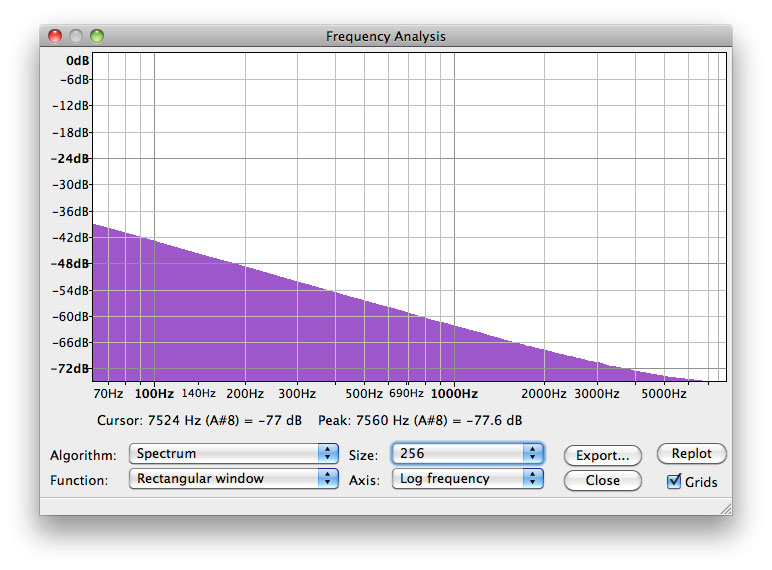Audible Number Sequences
Just for the fun of it (and to get some useful raw material for weird noise mucsical experiments) I took a bunch of number sequences, computed the first million entries, slapped them normailzed into a sound file @ 16kHz and see what happens. Some of them are quite nice. Enjoy.
1,000,000 samples at 16 kHz results in 1:02.5 minutes of sound and for each sound there also is a picture of the waveform. If the waveform of the whole sound would reduce to a solid block of samples I increased the spatial resolution (i.e. zoomed in) to give more information.
Caveat: Some of the sounds are quite harsh and their levels are very different, so mind your speakers/ears.
Euler's Pentagonal Theorem
Sample(n) = (-1)^m if n is of the form m(3m+-1)/2, otherwise a(n)=0
Sloane's A010815

Goldbach decompositions
Sample(n) = the number of decompositions of 2n into an unordered sum of two odd primes
The number of Goldbach decompositions is strictly increasing on the long run (well, most likely), so it starts pretty soft.
Sloane's A002375

Moebius function
Sample(1) = 1; Sample(n) = (-1)^k if n is the product of k different primes; otherwise Sample(n) = 0
Sloane's A008683

Merten's function
Sample(n) = Sum{1<=k<=n} mu(k), where mu is the Moebius function
The partial sum of the moebius function produces a wind like sound, albeit pretty quite.
Sloane's A002321

Nearest integer to sin()
Sample(n) = round(sin(n))
Creates several overlayed frequencies.
Sloane's A000494

Nørgård's Infinity Sequence
Sample(0)=0, Sample(2n) = -Sample(n), Sample(2n+1) = Sample(n) + 1
Invented in an attempt to unify in a perfect way repetition and variation. This was probably not what he invented it for...
Sloane's A004718

Primerace modulo 3
Sample(n) = (Number of 3k-1 primes <= n) - (Number of 3k+1 primes <= n)
Also known as Chebyshev Bias.
Sloane's A038698

Interestingly this produces a pretty perfect pink noise...

Primerace modulo 4
Sample(n) = (Number of 4k-1 primes <= n) - (Number of 4k+1 primes <= n)
This produces an almost identical pink noise to primerace mod 3.
Sloane's A038698

Surfeit of oddly factored numbers over evenly factored numbers
Sample(n) = (Number of oddly factored numbers <= n) - (number of evenly factored numbers <= n)
This also produces a cool pink noise.
Sloane's A072203

Smallest distance to prime power
Sample(n) = min(abs(n-k)) : where k runs through the prime powers
Sloane's A080732

Somehow the OEIS doesn't seem to list the non-absolute version which also sounds quite nice:
Sample(n) = min_of_abs(n-k) : where k runs through the prime powers

Zero bits minus one bits
Sample(n) = (Number of 0's)-(number of 1's) in base 2 representation of n
Sloane's A037861

Legendre symbol (n,31)
Sample(n) = legendre(n, 31)
See description below

Partial Sum of Legendre symbol (n, 31)
Sample(n) = Sum{1<=k<=n} legendre(k, 31)
To be honest, this sound is not particularly interesting, I just wanted to have a Legendre sequence in it with a lower modulus for comparison. Oh, and I liked the shape of this waveform. Now if I could find another one that is penguin shaped or so...

Legendre symbol (n,257)
Sample(n) = legendre(n, 257)
Sloane's A165573

Partial Sum of Legendre symbol (n, 257)
Sample(n) = Sum{1<=k<=n} legendre(k, 257)
Sloane's A165575

Legendre symbol (n,263)
Sample(n) = legendre(n, 263)
Sloane's A165574

Partial Sum of Legendre symbol (n, 263)
Sample(n) = Sum{1<=k<=n} legendre(k, 263)
Sloane's A165576

Legendre symbol (n,1597)
Sample(n) = legendre(n, 1597)

Partial Sum of Legendre symbol (n, 1597)
Sample(n) = Sum{1<=k<=n} legendre(k, 1597)

Legendre symbol (n,8191)
Sample(n) = legendre(n, 8191)

Partial Sum of Legendre symbol (n, 8191)
Sample(n) = Sum{1<=k<=n} legendre(k, 8191)

Legendre symbol (n,28657)
Sample(n) = legendre(n, 28657)

Partial Sum of Legendre symbol (n, 28657)
Sample(n) = Sum{1<=k<=n} legendre(k, 28657)

Legendre symbol (n,65537)
Sample(n) = legendre(n, 65537)
65537 is the 4th Fermat prime.
Sloane's A165471

Partial Sum of Legendre symbol (n, 65537)
Sample(n) = Sum{1<=k<=n} legendre(k, 65537)
65537 is the 4th Fermat prime.
Sloane's A165472

Partial sums of (-1)^floor(n*e)
Sloane's A123739

Partial sums of (-1)^floor(n*phi)
Here phi is the golden ratio (1.618...)

Partial sums of (-1)^floor(n*pi)
Sloane's A123738

Partial sums of (-1)^floor(n/pi)

Partial sums of (-1)^floor(n*2^(1/3))
Sloane's A123724

Partial sums of (-1)^floor(n*sqrt(2))
Sloane's A123737

Partial sums of (-1)^floor(n/sqrt(2))

Partial sums of (-1)^floor(n*log10(e))

Partial sums of (-1)^floor(n*ln(10))

